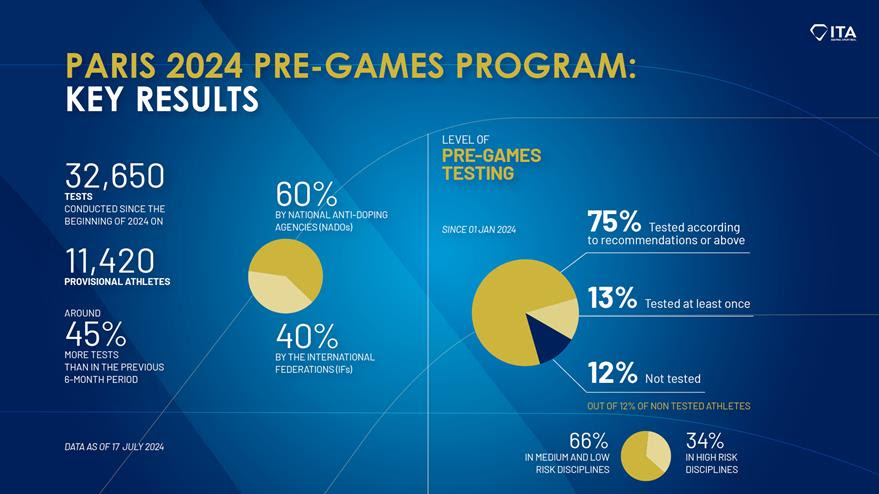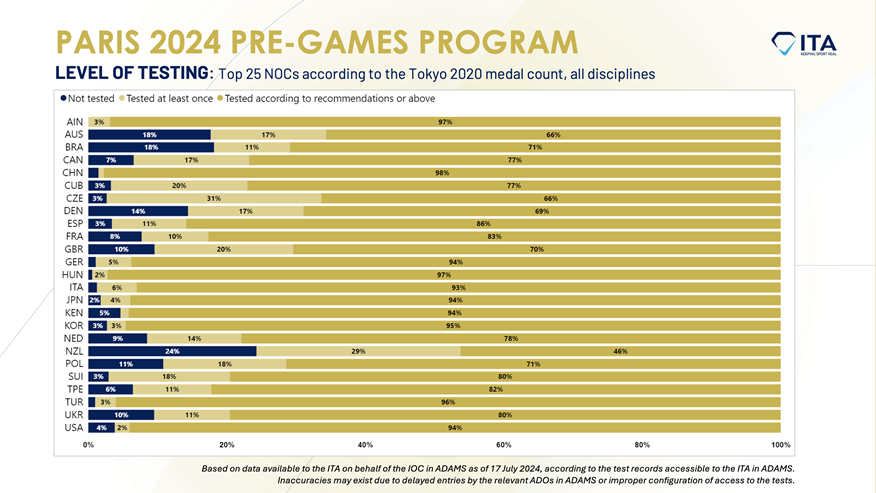The International Testing Agency (ITA), leading an independent anti-doping program for the Olympic Games Paris 2024, concludes in collaboration with all Summer Olympic International Federations (IFs) and National/Regional Anti-Doping Organisations (NADOs/RADOs) a comprehensive pre-Games program in the lead-up to the event and reports a high implementation with 88% of participating athletes tested at least once since the beginning of the year. Over 32.600 doping controls were implemented in that period, corresponding to around 45% more testing than in the previous 6 months on the same athlete population. Special focus was put on high-risk disciplines, of which 75% of participating athletes were tested three times or more and 95% at least once. These results surpass those achieved for Tokyo 2020 and make the Paris 2024 pre-Games program the most complete to ever be implemented. The ITA Paris 2024 pre-Games Expert Group supported worldwide testing activities by anti-doping organisations ahead of the Games by issuing recommendations specifically targeting potential testing gaps to ensure a level playing field in the lead-up to and during the Olympics.
The Paris 2024 pre-Games program is part of the ITA’s comprehensive anti-doping strategy for the Olympics, which also includes Games-time testing as well as long-term storage and re-analysis after the event. It constitutes a key phase of the clean sport efforts for Paris 2024 and aims to ensure that all athletes can compete on a level playing field during the Games, no matter where they come from. During this preparatory period, it was the shared responsibility of the respective International Summer Olympic Federations (IFs, or the ITA on their behalf) and National/Regional Anti-Doping Organisations (NADOs/RADOs) to subject their athletes to a risk-proportionate testing regime before they compete in France. The ITA pre-Games program provided an additional layer of independent strategic support and monitoring, to ensure athletes were tested adequately ahead of the Games.
The ITA Paris 2024 pre-Games Expert Group, consisting of four international experts from three NADOs and one IF, as well as specialised in-house ITA experts, established a bespoke risk assessment for athletes likely to participate in the Games. This assessment combined a large set of data and risk factors, including testing gaps observed across sports and countries. This allowed the group to share testing recommendations with other anti-doping organisations (IFs and NADOs/RADOs) to ensure that effective testing was conducted globally through a coordinated effort.
Whereas the ITA-led pre-Games program for Tokyo 2020 focused on issuing recommendations covering specific individual athletes and teams belonging to a large pool of potential participants in the Olympic Games, the model for Paris 2024 focused on specific recommendations supporting the detection of gaps in strategic aspects of anti-doping programs. This approach was not only quantitative, but also integrated qualitative components based on the experiences and data models that the ITA was able to establish based on its mission for Tokyo 2020. In addition, all testing recommendations issued to the concerned IFs and NADOs/RADOs around the world were then monitored by the ITA and its Expert Group to help achieve their implementation. The work of the ITA Expert Group was overseen by a Supervisory Panel consisting of athlete representatives, a wider pool of experts and a World Anti-Doping Agency (WADA) observer to assess any gaps observed as part of WADA’s Code Compliance monitoring program.
With the Olympic Games Paris 2024 starting, the outcome of the pre-Games programs that lasted until 17 July shows that most anti-doping organisations diligently followed the testing recommendations issued by the ITA Paris 2024 pre-Games Expert Group. Over 75% of the recommendations were executed, resulting in over 32.600 doping controls in this period. This represents close to 45% more doping controls performed since the beginning of the year compared with the previous period (July-Dec 2023). A specific focus was put on athletes competing in high-risk sports and disciplines, which were recommended to be tested at least three times during the pre-Games period. Of this group, 95% were tested at least once, 75% three or more times and only less than 5% were not subject to any testing. With 88% of all participating athletes tested at least once since the beginning of the year, this high outcome rate surpasses Tokyo 2020’s pre-Games efforts where 85% of athletes were tested ahead of the Games. These numbers underline the motivation and willingness of anti-doping organisations across the globe to contribute to the common goal of fair play at the Olympic Games. The ITA will now adapt as need be its testing strategy during the Games including the outcomes of the pre-Games program to continue to avoid any testing gaps.


Please note that the above statistics pertain to preliminary results of the ITA Paris 2024 pre-Games program with data as of 17 July 2024.
The pre-Games program led to targeted testing by the ITA on the 80% of the summer Olympic sports it has been entrusted to manage anti-doping activities for. The ITA can report that these efforts led to over 85 cases of potential anti-doping rule violations, resulting in many sanctions and cases that are still ongoing or under review.
The project, however, also revealed some testing gaps from a number of actors which did not fully or partially implement the testing recommendations. These will be shared with WADA, the global anti-doping regulatory body and also transparently published in a detailed report by the ITA after Paris 2024. This feedback and final data will also be used to further enhance the pre-Games program for future editions of the Olympic Games.
“Pre-Games testing is not only key when it comes to risk and anti-doping strategies, it also aims at giving athletes and fans confidence in a clean Olympic Games. The ITA and its Paris 2024 Pre-Games Expert Group have worked very hard to coordinate and monitor a global testing program for athletes qualifying for the Games. I am very grateful to all the experts and anti-doping organisations who have contributed to this important work, as it is the most robust pre-Games program ever implemented for an edition of the Olympic Games,” said ITA Director General Benjamin Cohen.
“The high level of implementation that the NADOs, RADOs and International Federations have achieved demonstrates their commitment to fair play, and I hope that this shows the participating athletes that we are doing our best for clean competitions in Paris. At the same time, the project has highlighted some gaps, limitations and areas for improvement that we need to address immediately if we are to continue to raise the bar for all athletes who train so hard and want fair and clean competitions.”
MEDIA CONTACT
Marta Nawrocka
ITA Communication Senior Manager
communication@ita.sport
+41 78 330 96 46

